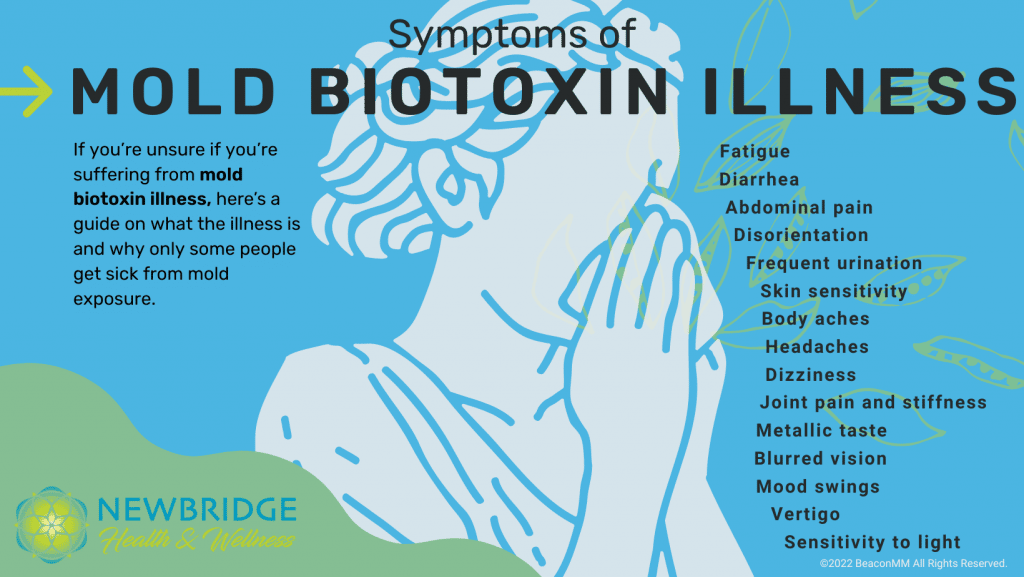Mold biotoxin illness can sometimes be difficult to detect. Some people may not realize that the cause of their pain or illness is mold exposure. Mold biotoxin illness can affect several areas of your body and shares symptoms with many other related conditions, which can make it hard to pinpoint the exact cause. You might seek treatment for symptoms, such as insomnia or headaches, without realizing the root cause of your condition is mold toxicity.
Additionally, not everyone gets sick from mold exposure. If you live in a house where everyone has been exposed to mold-produced toxins, it’s possible for only one person to feel sick while no one else experiences symptoms.
If you’ve been feeling unwell and can’t find answers, a functional medicine doctor can help you get to the root of your symptoms. Functional medicine analyzes your whole body, your environment, and your lifestyle when assessing what’s wrong. If you’re unsure if you’re suffering from mold biotoxin illness, here’s a guide on what the illness is and why only some people get sick from mold exposure.
Struggling with symptoms of Mold Biotoxin Illness? Newbridge Health and Wellness can help! Start your wellness journey.
What Is Mold Biotoxin Illness?
Mold biotoxin illness, or Chronic Inflammatory Response Syndrome (CIRS), is a complex condition that is related to the contamination of indoor air, food, water, or insect bites. When a person comes into contact with biotoxins such as mold, fungi, volatile organic compounds (VOCs), particulates, inflammagens, and other gram-negative bacteria, it can cause an inflammatory response presented through several symptoms.
Some people experience a small level of illness when exposed to sufficient biotoxins, but not everyone has severe conditions. Many people recover once they’re removed from a contaminated environment.
People may not know that they’ve been exposed to mold as they may be unaware of mold growing in their home or workplace. The mold can grow behind walls, under sinks, furniture, attic, and almost anywhere that has had water damage or moisture. It’s estimated that indoor pollutants, including mold, are concentrated two to five times higher than the pollutants found outdoors; it may cause 50% of patients’ illnesses.
Where Can You Get Exposed to Mold?
Mold thrives in moist environments that allow the bacteria to grow. One place you can come into contact with mold is in water-damaged buildings.
These are the most common areas to contact biotoxins as the bacteria grows, creating a toxic mix of chemicals, fungi, mycotoxins (dangerous toxins produced by mold), inflammagens, and more. A study found that 66% of water-damaged buildings showed signs of at least one mycotoxin present with the combination of biotoxin possibilities.
Another possibility can come from tick bites or microbial volatile organic compounds released by microorganisms that have bacteria, such as Borrelia or Babesia, which can contribute to CIRS. There is an intricate interplay between people affected by CIRS who have a form of tick-transmitted illness or vice-versa.
Why Do Some People Get Sick from Mold Exposure?
Chronic illnesses related to mold exposure are present in people genetically susceptible to improper toxin clearance, which is about 25% of the population. This population has human leukocyte antigen (HLA) genes that prevent their body from being able to “tag” the biotoxin and remove it. In other words, the biotoxin(s) are allowed to live in the body indefinitely and circulate, creating chronic inflammatory immune responses which lead to chronic illness.
People who aren’t genetically susceptible can have an acute illness when exposed to the biotoxins. Their body will process it in the liver and release it from the body. Following their exposure, their detoxification system will eliminate the biotoxins via the standard mechanisms, and symptoms usually subside.
Chronic illness patients should seek medical attention from professionals for treatment. Going to a Functional Medicine professional can help you find the root of your problem as they look at the whole body rather than the symptoms.
Are you looking for mold biotoxin illness treatments? Contact Newbridge Health and Wellness to get started!
What Are the Symptoms of Mold Biotoxin Illness?

One of the reasons why mold biotoxin illness can be difficult to diagnose is that it can show up in various symptoms. It can present itself in many shapes such as neuro, allergies, cardiovascular, or digestive issues. The wide range can sometimes lead medical professionals to think that the illness is caused by something else.
If you have mold biotoxin illness, you may experience any of the following symptoms:
- Fatigue
- Weakness
- Diarrhea
- Abdominal pain
- Disorientation
- Static or electric shocks
- Frequent urination
- Trouble regulating body temperature
- Skin sensitivity
- Pins and needles feelings on the skin
- Body aches
- Headaches
- Trouble concentrating
- Dizziness
- Joint pain and stiffness
- Muscle cramps
- Impaired memory
- Can’t find the right words
- Congestion
- Shortness of breath
- Metallic taste
- Watery eyes
- Blurred vision
- Red eyes
- Mood swings
- Anxiety
- Vertigo
- Lightheadedness
- Sensitivity to light
Many of these symptoms can often correlate to other medical issues that you or your doctor may believe are caused by something else. If you suspect that you’ve had mold exposure and are experiencing these symptoms, a functional medicine doctor can perform extensive testing to get the full picture and determine in mold exposure could be the cause.
How to Diagnose and Treat Mold Biotoxin Illness
If any other illness can’t explain your symptoms, it could be mold biotoxin illness. One of the first things you should do is evaluate your work or home area for the presentation of mold growth. For places in your home, you should check areas with a lot of moisture, such as a bathroom, laundry room, or kitchen.
Something to note when seeking help is that there is a difference between mold toxicity and mold allergy. Mold allergies are caused by mold spores that become inhaled and stimulate symptoms similar to hay fever. Mold toxicity is caused by volatile toxic vapors dispersed by mold, leading to a chronic inflammatory response.
When seeking help, tell your doctor about potential mold exposure or any concerns you have. Some treatments for CIRS can include:
- Eliminating the exposure: One way to prevent further problems is getting rid of the mold within your environment and preventing mold growth with the humidity of your property staying around 50% to make it harder for mold to grow.
- Removing biotoxins: If you’ve been diagnosed with mold biotoxin illness or CIRS, you’ll want to follow a detoxification process to eliminate toxins and support your liver in recovery.
- Having supportive nutrition: Having a good diet can help you recover through nutritional foods that are anti-inflammatory and rich in antioxidants, fiber, and vitamins and minerals to support your body’s detoxification.
If you want to take a Functional Medicine approach to your care, there are also other things that you can do to help support your recovery. These modalities include:
- Using herbs and supplements
- Utilizing ozone therapy
- Trying a far infrared sauna
- Using low-dose immunotherapy
- Trying CranioBiotic Technique (CBT)
These treatment options can help reduce the symptoms and help you recover from mold biotoxin illness. You should seek help from a medical professional to ensure that this is the root of your problems and that you undergo the right treatment therapy.
For some, detoxing from mold can be an issue. Methylation is a process that occurs in each cell to help the body make biochemical conversions, and this can be challenging for those that are genetically susceptible to mold biotoxin illness.
Methyl groups onto proteins, amino acids, enzymes, and DNA, and regulates things like healing and genetic expression, liver toxification, and immune function. Seeking help from a Functional Medicine professional can help you find alternatives to treatment options if you face methylation problems.
How Can Newbridge Health and Wellness Help?
Newbridge Health and Wellness takes a functional medicine approach to treating you. They want to get to the root of the problem and avoid just treating symptoms. We have an individualized, patient-centered, science-based systems approach to your health that empowers us to work together to promote optimal wellness.
Functional Medicine can be the right option for you if you’re suffering from mold biotoxin illness or CIRS. With this approach, we analyze all of your symptoms and look for the underlying cause. Your body systems work together and can often show signs if something is wrong. This is why mold biotoxin illness can often affect multiple bodily systems.
Newbridge Health and Wellness specializes in treating chronic illness. If have tried other medical treatment methods and still feel unwell, functional medicine can help by going beyond symptom treatment and digging deeper into long-term solutions that consider your health as a whole. We’ll figure out what is causing your problems and work through them together.
Are you ready to find the root cause of your problems? Schedule an appointment with us today!


